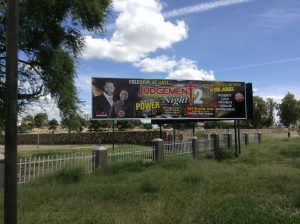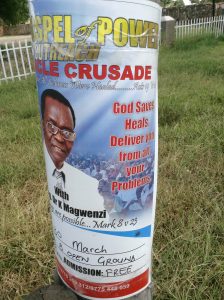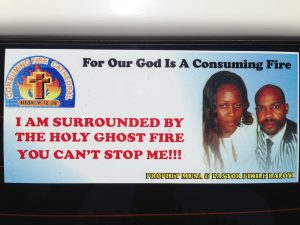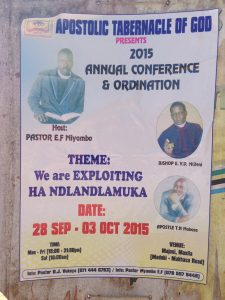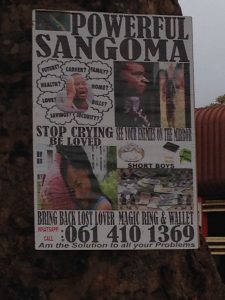Not five meters from where I was sitting on the front row, I heard an African pastor shout, “Command it [money] into your bank account!” The scene is fresh in my mind since I just returned this evening. Here are some quotes from the night.
“The devil must see you and run away because he’s afraid.”
“When someone is sick they must be healed because you are a god to the world.”
“They shouldn’t look for a sangoma, they should look for you [because you are able to speak health and life into existence as well as stop funerals.]”
“I stand here and declare, ‘You, Money, come to me. … The Bible says, ‘Money answers all things.’ So if money answers all things it means whoever has ears to hear, so it must answer to me. [sic] To my needs. So I say, ‘Money, I have a need. Come and answer.’ Hallelujah! Praise the Lord!”
“Command it [money] into your bank account. Arise and shine. Shout to the Lord. Whoever calls upon the name of the Lord will be saved. That situation cannot stand in your presence.”
Is this wicked or bizarre? Vile trafficking in religion for personal gain or a good occasion for sarcastic mockery? Should I be crying for them or laughing at them? Certainly, no Christian could join them.
This is not the first time I have born witness to religious identity theft. The preacher and people thought of themselves as “Christian,” yet I heard no Christian doctrine tonight.
Let me review the evening in some categories for the purpose of helping those who live near this environment, but struggle to articulate the errors. Others who look at these antics as foreign, should pray for those of us who are laboring here, and secondly, you should not make the mistake that there is a great revival of religion in Africa. Even though statistics call 75% of this country Christian.
Marks of Entertainment
The planning of the hall said, “Show business!”
- The praise band had 12 members and mimicked all the common marks of popular music. A lead singer in a tight outfit, drums with a microphone poked inside, and high volume. Whatever level you’re thinking of, it was louder–just like a good band selling tickets.
- When the speaker began, even though he was a Venda, he spoke in English while a translator tried to keep up. It was obviously a trick because he interrupted the translator the entire sermon. He shouted over her, and when she didn’t get it right, he spoke in Venda himself. The rest of the evening was handled in Venda, but not the sermon. We all had to see that the speaker was not a dumb rural, village black–no, he was an educated, rich man.
- Name brand, electronic devices were highlighted. All the people sitting at the head table held Apple products visible for all to see. The speaker carried only an iPad to the podium. “Don’t call me backward or poor!”
- The volume was deafening. The speaker waited for a few moments before saying his first word to the huge crowd of 100 people until the microphone was turned on. Never mind the fact that at African funerals, everyone speaks to 300+ people without a microphone in the outside. They were looking for effect. Just like a show.
- With so many people, it was obvious that we had to have a video of the speaker projected on the screen while he spoke. But wait, the video projector man arrived late and distracted everyone while he set up, and in the end, the faces of the speakers on the screen were smaller than they were in real life. But we do love technology, don’t we?
- The flare of the speaker said, “I could be a star. No, I should be a star!” The bouncy diction, the bellowed names of deity, and the oozing confidence all bespoke the stage of modern entertainment.
- At the end of the night, he “healed” 5 people who were struggling with things like “warmness in my legs” (Today was 96 degrees Faranheit in the shade.) and a “spirit of limitation” that kept a poor man from finding employment. But he did it all with such pizzazz. Two women fell over as the word “Jesus” shot out of his mouth. A real crowd pleaser. It reminded me of a previous crusade where the pastor shouted during this time, “She’s vomiting blood here! This one’s vomiting blood!”
The night was devoted to entertainment even though they said repeatedly, “We worship you!” and “Lion of Judah! Holy is your name.” It was amateur entertainers for a group of tired people to enjoy while feeling good about being morally superior to those others who don’t come to “church.”
Marks of a False Gospel
This movement is as slippery as buttered soap in a bathtub. Many Christian sounding phrases echo around the hall if by any means God-talk can get them closer to their real end. But ask a church-goer how many of the people in that room were immoral before they were married. Ask an average church member if he knows of singers, musicians, speakers, translators, and leaders who are currently in some form of fornication. Ask a church member if the majority of church members would steal R1,000 if it were found lying with no one around it. I have asked these and other questions commonly, and my informant usually (always?) admits that most of the people do these things.
When the preaching starts, watch what happens to the people’s hearts. They are inevitably drawn by clever stories and artful use of the OT to this earth. I have even heard an African preacher say, “It’s boring in Heaven!” The goal is to move people away from any serious pondering about the next life because they have no message for the next life. In fact, tonight I heard this man twist John 3:16 into prosperity theology. He said we are promised everlasting life which means “abundant life–better life–the god-kind of life.”
And this is all accomplished by ignoring humility and repentance. After the service, I approached the speaker and asked him why he did not mention humility, repentance, or the lake of fire. He said, “I did that last night.”
I replied, “I know there is a man here that I have been evangelizing. He told me that his name is not written in the book of life. Why didn’t you tell that man tonight how he can be saved?”
His answer, “I forgive you for condemning me. Now you need to go.”
I pressed, “What do you say to that question? Why didn’t you tell him the truth?”
He then looked for an usher saying, “He needs to go. He has a different spirit.”
Had I the wit, I would have replied, “Then why don’t you cast it out? You’ve supposedly cast out these other demons during the miracle time a few moments ago?”
Prosperity preachers love the OT. They can find 1,000 ways to preach prosperity from the first half of the Bible. Every time something speaks about Israel, we just grab that for the group sitting in the room right now. Tonight he said, “We are all in the land of Goshen!” Just like in the time of Moses though, there is no effort to discern who is a true Christian. He just assumes and expands the notion of Christian to include anyone he is talking to.
But one of the most angering aspects of these charlatans is there vague language. They use words like breakthrough, blessing, on top, above the circumstances, with Christ, winners, success, abundant life, in the light–virtually any positive expression–to mean a comfortable life here on this earth. He said tonight that if we walk in the light, thieves will run from our cars. Being unclear allows him greater protection from people who actually care about the meaning of the Bible. Sometimes using the words of the Bible is a coward’s trick to avoid accountability for your own false doctrine.
Before I came to the service tonight, I mentioned to my friend that I would look for two things: humility and exegesis rather than eisegesis. The negative score on both accounts forces me to the two conclusions that I have reached many times already.
- Most African churches are like this.
- These churches have almost nothing in common with the religion of Jesus Christ.

